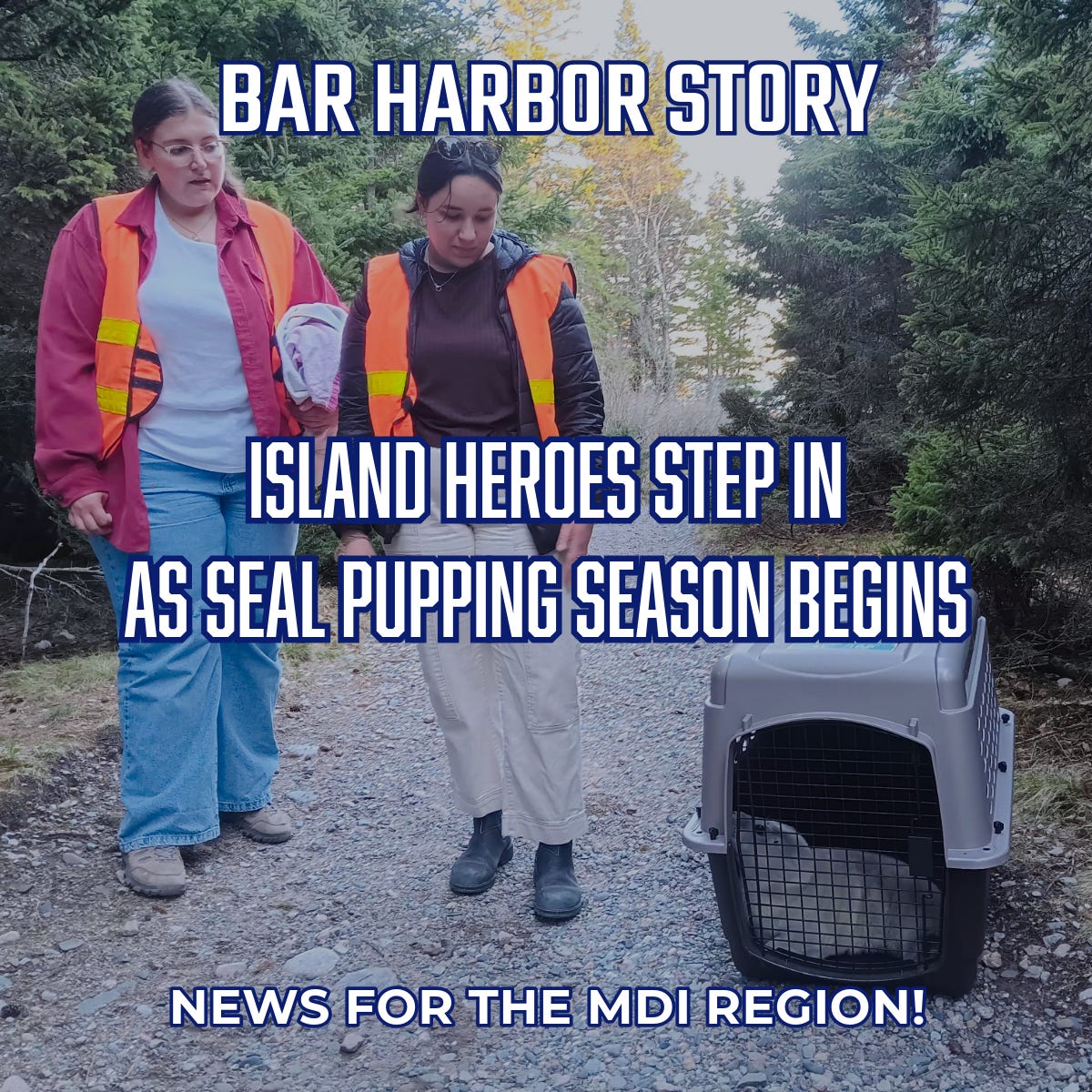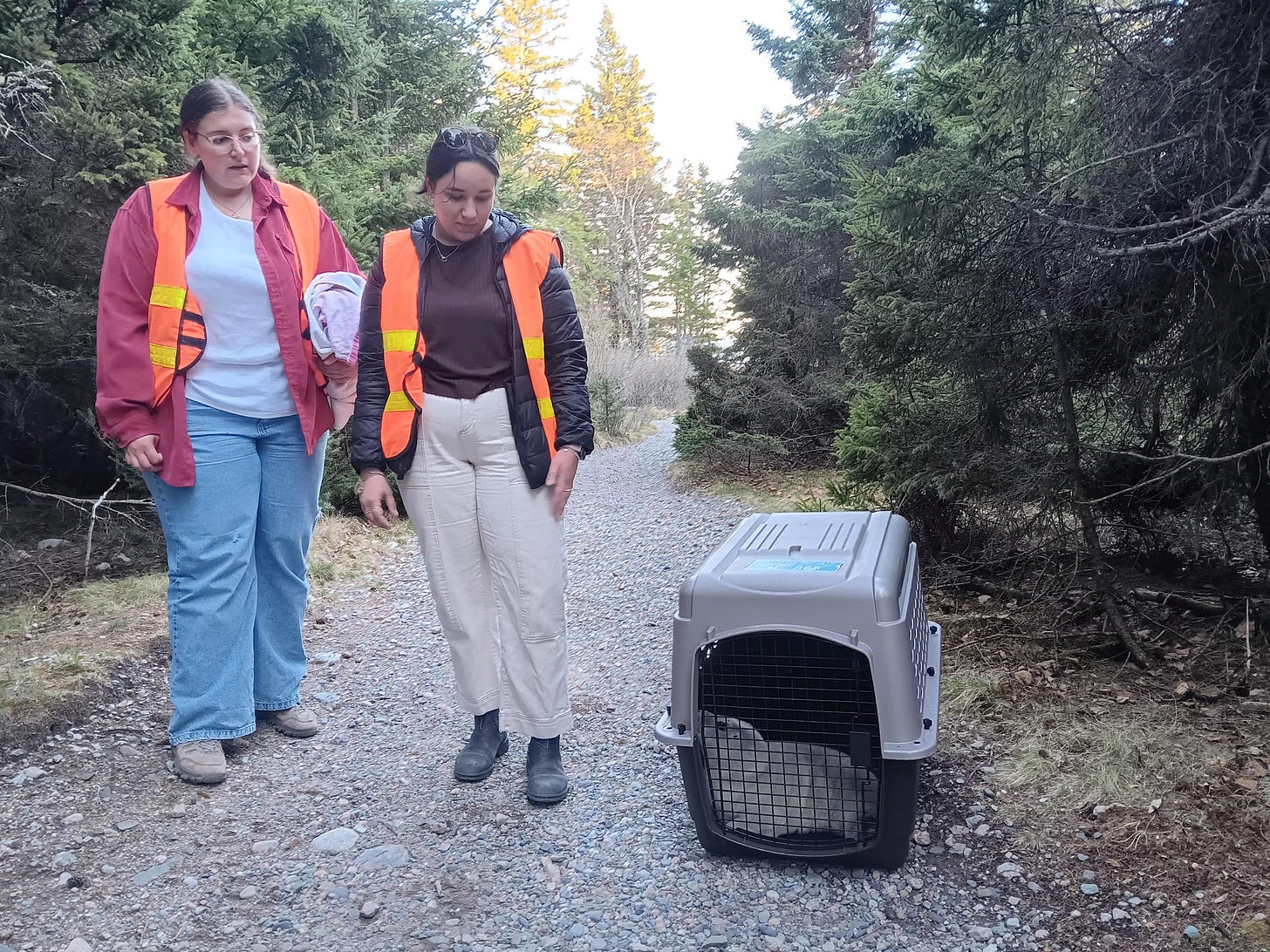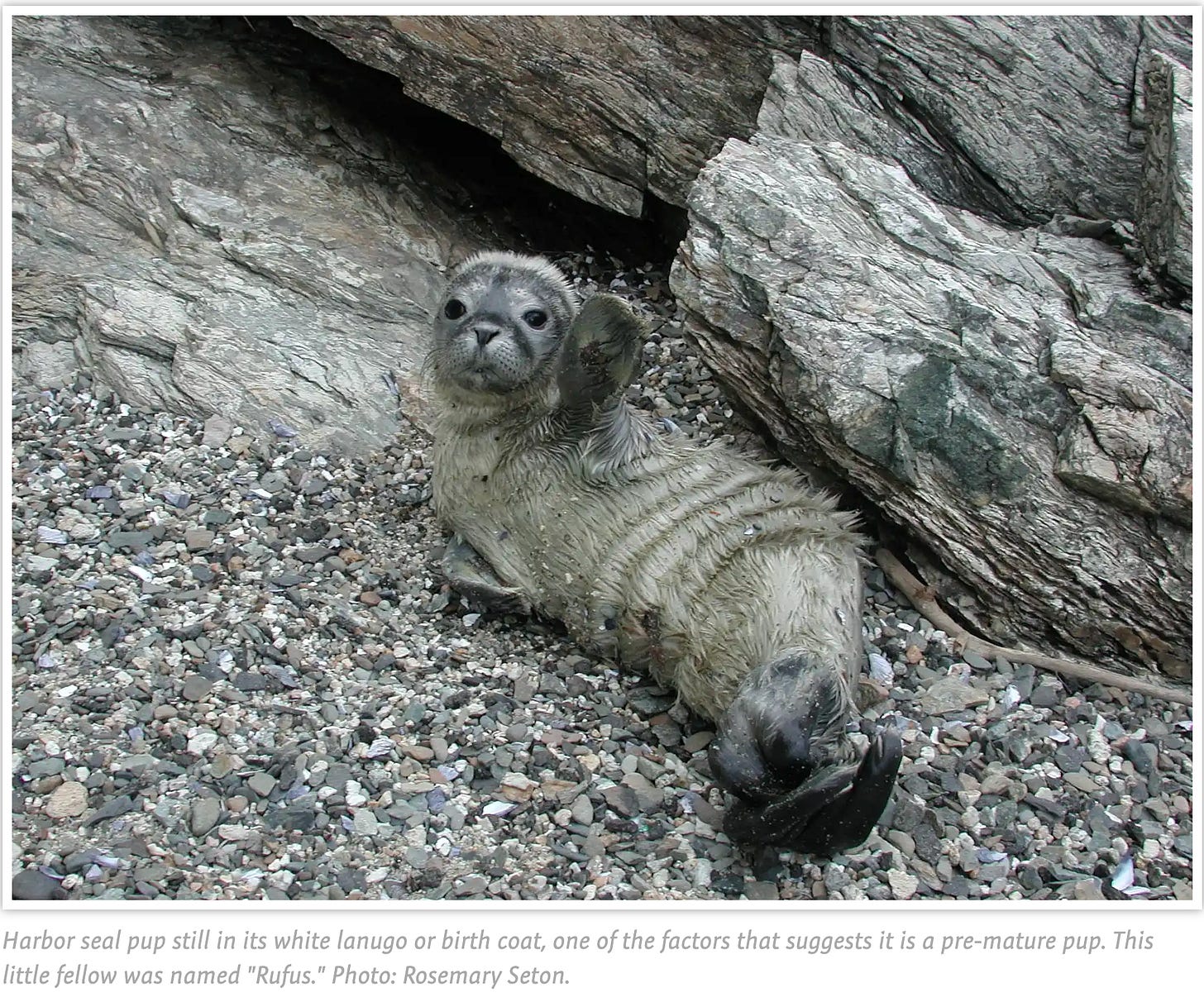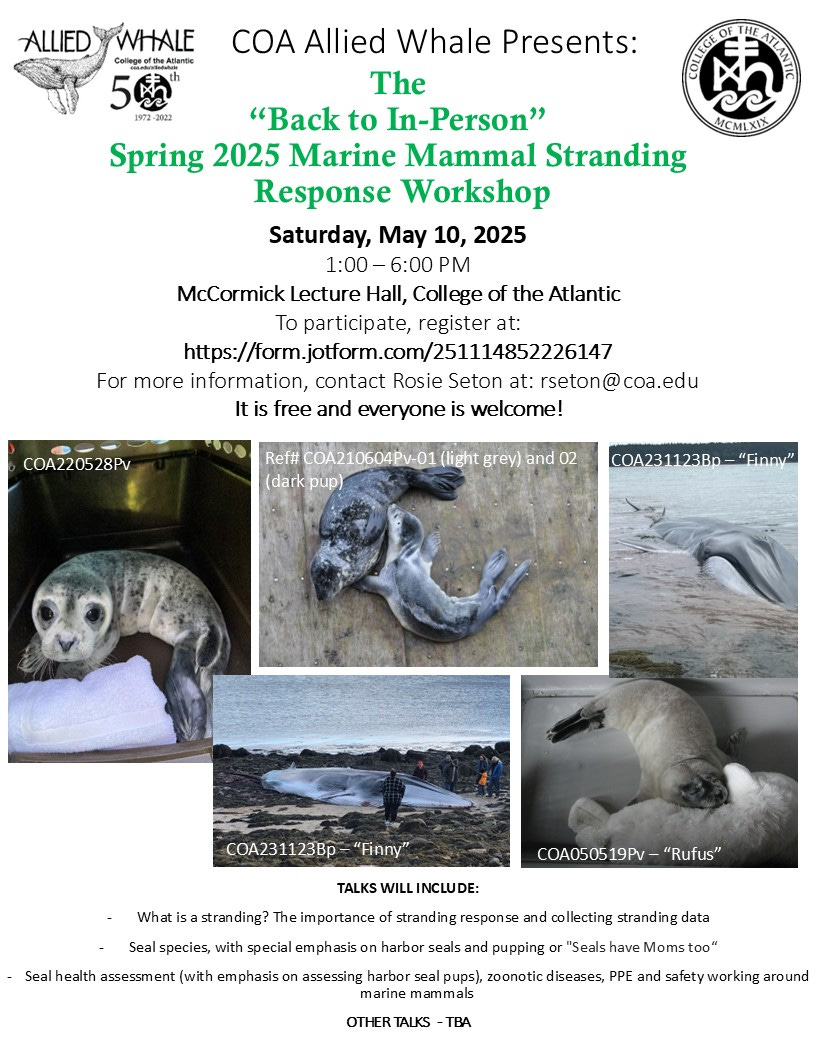Island Heroes Step In as Seal Pupping Season Begins
Allied Whale and local volunteers rescue harbor seal pup, offer public workshop May 10
WONDERLAND—Every once in a while, you’ll spot them: secret heroes of the animals on and around Mount Desert Island and even beyond.
Some of them are private citizens who spot an animal in trouble and leap into action.
Some of them are the staff and volunteers at Acadia Wildlife Center.
Some are animal rescues or police officers and game wardens and firefighters, known for rescuing horses, eagles, dogs, and cats.
And some are with Allied Whale from College of the Atlantic, the marine mammal group from College of the Atlantic.
“Since its beginning, Allied Whale has been at the forefront of modern whale research and is recognized as a leader in the development of techniques used by whale biologists world-wide,” its website reads. “Allied Whale is involved in field research projects that are far ranging, both scientifically and geographically.”
They are researchers, but they are also rescuers.
It’s the busy season for Allied Whale staff and volunteers who help with strandings. Harbor seal pupping season has begun. That often means that reports of potentially abandoned seal pups come in to Allied Whale. Those reports have started. There were two reports this past week.
One seal pup was reported on Wonderland in Acadia National Park and transported by Allied Whale, May 1.
The seal pup was transported by Rosie Seton to a rehabilitation facility on May 2, a process that keeps her on the road all day. Seton is Allied Whale’s animal stranding coordinator.
“Two of our trained students collected the harbor seal pup reported by the Wonderland Trail in the late afternoon of May 1. We held the pup overnight and stabilized with fluids in the evening,” Seton said. “The following morning, May 2, we administered fluids again and I drove the pup to our colleagues the Marine Mammals of Maine where the pup is now in rehab.”
Allied Whale relies on trained volunteers to help assess reported animals and retrieve animals when they are in danger. It also collaborates with the Greater Atlantic Regional Stranding Network and the Maine Strandings Collaborative. Often, ill animals are taken to rehab facilities.
Maine’s only marine animal center (the Marine Animal Rehabilitation Center (MARC) at the University of New England in Biddeford) closed in 2014.
Animals needing rehabilitation service are now brought to either the National Marine Life Center in Massachusetts or the Mystic Aquarium in Connecticut.
Allied also works with Marine Mammals of Maine, which rescues animals on the coast south of Rockland. They respond to cetaceans (whales, dolphins, and porpoises) strandings as well.
“This is now harbor seal pupping season and we get a lot of calls about the pups in May when they are dependent pups through July when they are weaned, independent pups. They only nurse for around four weeks or so and are then on their own,” Seton said.
In the last fifty years, mostly because of the Marine Mammal Protection Act (1972, bars killing and harassment of marine animals, including seals), seals (gray and harbor) have come back to their historic range and recolonized it.
As more seals come back to Maine, more interact with humans. The Marine Mammals of Maine director recently said approximately half of all the seals that group encounters that need rehabilitation are because they interacted with people, somehow.
Sometimes people think a seal pup is abandoned when its mother has just gone off hunting. Sometimes people try to take seal pups home. Sometimes they disturb its rest by coming too close in a boat or kayak or interacting on a beach.
Local people who want to know more about what Allied Whale does and seal stranding can attend a May 10 workshop at College of the Atlantic to do just that.
“It is free and all are welcome whether you are interested in volunteering or simply to learn more about stranding response and marine mammals,” Seton said.
“The workshop is a great way to learn about the seals that inhabit the Downeast coast, how their health is assessed, and the importance of stranding response. Participants will have a chance to meet some of the members of the local stranding response community and see how they might be able to plug into their work,” said College of Atlantic’s Dean of Communications Rob Levin.
Sometimes those pups end up in strange places like in 2019 when one was hanging out on Ellsworth’s Bayside road.
Allied Whale begins appearing in newspaper searches in the early 1970s always linked with College of the Atlantic professor, Steve Katona. Katona, who eventually became the president of the college, and other faculty, staff and students founded the marine mammal laboratory at College of the Atlantic in 1972. Its current director is Professor Dr. Sean Todd.
NOAA Fisheries has authorized the group so that it can respond when there is a stranding or other marine mammal emergency. Allied Whale responds to strandings from Rockland to the Canadian border, which is approximately 2,600 miles.
According to its website, “The types of strandings to which Allied Whale typically responds includes the harbor seal pups in spring and summer time and harp and hooded seals—collectively known as the ‘ice seals’—during the winter months.”
THE WORKSHOP
COA Allied Whale will hold its annual Spring Stranding Response Workshop on May 10 from 1:00-6:00 p.m. in the McCormick Lecture Hall on the campus of the College of the Atlantic.
To register for this in-person event, go to: https://form.jotform.com/251114852226147
This is a free workshop for anyone who is interested in marine mammals, in stranding response, and or simply wants to learn about the marine mammals with whom we share the shore and waters of Maine.
For more information, please email: rseton@coa.edu
HOW TO SUPPORT ALLIED WHALE.
You can head over here to donate. https://www.coa.edu/allied-whale/donate-now/
According to its website, “Gifts to Allied Whale at COA support important marine mammal research, the marine mammal stranding program, and photo identification.
”Your gift supports research that will answer important questions about marine mammals. Allied Whale has been conducting research and education for over five decades, and your contribution helps us to continue this important and collaborative work. Our long-term monitoring and investigation of marine mammal populations examines where whales find food in the summers, where they spend their winters, how long they live, and their role in the environment. In addition to our field research, College of the Atlantic is the only college in the northeastern United States authorized by the National Oceanic and Atmospheric Administration (NOAA) to respond to marine mammal strandings from Rockland, Maine to the Canadian border.”
HOW TO REPORT A STRANDING
To report a marine mammal stranding please call:
Office 207-288-5644
Cell 207-266-1326
HOW TO REPORT OTHER POTENTIAL ANIMAL ISSUES THAT ARE NOT MARINE MAMMALS

”Wildlife professionals such as Maine game wardens, wildlife biologists, licensed wildlife rehabilitators, and animal damage control agents can help you assess different wildlife scenarios to determine the best course of action,” Maine Inland Fisheries said on May 3. “For your safety and the safety of the animal, never handle or move wildlife unless directed to do so by a wildlife professional. In the rare cases when intervention is justified, their knowledge and experience will help ensure the safety of all those involved.”
For deer, bear, moose, and turkey exhibiting signs of critical illness or injury, please contact your local MDIFW wildlife biologist or game warden.
For all other species, please contact a licensed wildlife rehabilitator or animal damage control agent.
Acadia Wildlife Center asks that if people find an animal in potential need that you call the not-for-profit at (207) 288-4960 before doing anything.
“If you get an answering machine, leave us a message and listen to the instructions carefully. Please be patient, we will call you back as soon as we can,” they write.
Acadia Wildlife Center cares for “mammals, birds, reptiles, and amphibians from mid-coast Maine, with the goal of returning healthy animals back to their homes in the wild.” Staff and volunteers answer approximately 5,000 calls each year and tend to house 100 patients at a time.
Follow us on Facebook. And as a reminder, you can easily view all our past stories and press releases here.
If you’d like to donate to help support us, you can, but no pressure! Just click here (about how you can give) or here (a direct link), which is the same as the button below.
If you’d like to sponsor the Bar Harbor Story, you can! Learn more here.









Steve's last name is spelled Katona. No "h"